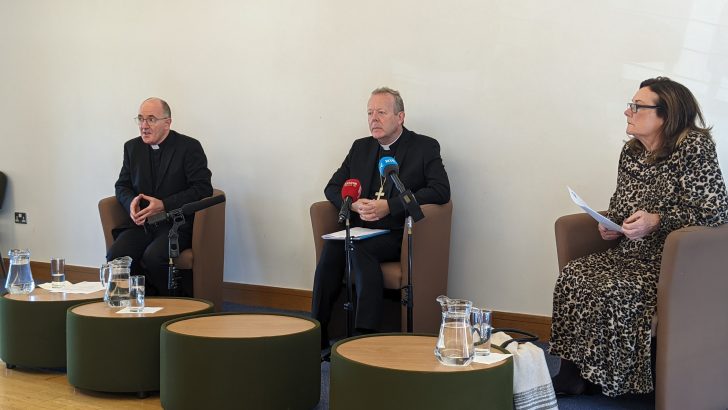The Diocese of Dromore has vowed that it will commit whatever resources are available to a new redress scheme for survivors of clerical sexual abuse.
Archbishop Eamon Martin made the commitment in Newry today (Wednesday) while announcing the formation of an independent panel and insisted that the process will be managed by a third party organisation rather than the Church.
Dr Martin has served as apostolic administrator in Dromore since 2019. Bishop John McAreavey resigned in March 2018 following criticism of his handling of allegations of abuse.
In a statement today, the diocese said that it “apologises unreservedly for the hurt and damage caused to victims and survivors of any priest or Church representative acting under its authority.
“The Diocese of Dromore finds such behaviour towards children and vulnerable people abhorrent, inexcusable and indefensible,” it said.
Announcing the new scheme, the dioceses said it is “committed to doing what it can to help bring healing to the survivors of clerical sexual abuse, and to all those affected by these egregious crimes”.
The statement added that the redress scheme has come about after meetings with a number of survivors and an examination of the various existing legal claims against the diocese.
Archbishop Martin said he “wishes to facilitate a resolution process to enable the provision of financial and other supports for survivors without undue further delay”.
This new scheme will be open to victims and survivors of child sexual abuse suffered at the hands of representatives of the diocese. The statement said that the process endeavours to ensure a process which is victim-centred and aims to provide victims with recognition and reasonable compensation without the need for lengthy investigation and litigation.
It said the scheme may take varying forms. As well as enabling the provision of financial redress, the scheme includes the possibility of a personal apology on behalf of the diocese and other ways of providing pastoral support.
The diocese will also support the provision of counselling via the ‘Towards Healing’ service established for survivors of abuse in the Church.
The statement insisted that the diocese “is willing to commit whatever resources it has available for the purpose of redress to this scheme, even if that should exhaust those resources”.
The scheme will respond to applications where there are allegations of sexual abuse – including sexual grooming – which may or may not have been accompanied by physical and/or emotional abuse, and which occurred when the applicant was under the age of 18.
All applications will be assessed by an independent panel, appointed via an independent process managed by a third party organisation.
The diocese said that in assessing applications the panel will have regard to all the available information and make its decision on the balance of probabilities and on a majority basis.
The process will fall outside the civil litigation process and be comparable to a mediation and it is anticipated that the process will be informal in nature but is intended to be binding on the parties should a resolution be agreed.
Dr Martin said he remains committed to continuing his ongoing pastoral outreach to survivors, making himself available to meet with those victims who wish to share their story with him and to consider with him other ways in which their pain can be acknowledged and by which their healing can be assisted.
Controversy was sparked in Dromore following a BBC programme which investigated allegations against the late Fr Malachy Finnegan. Fr Finnegan worked at St Colman’s College in Newry from 1967 to 1987, the last decade as the school’s president.
He went on to serve as a parish priest in Co. Down and died in 2002.


 Michael Kelly
Michael Kelly Archbishop Eamon Martin, apostolic
administrator of Dromore Diocese launches the redress scheme on September 29. He is flanked by Fr Feidhlimidh Magennis and Patricia Carville, safeguarding officer. Photo: Chai Brady
Archbishop Eamon Martin, apostolic
administrator of Dromore Diocese launches the redress scheme on September 29. He is flanked by Fr Feidhlimidh Magennis and Patricia Carville, safeguarding officer. Photo: Chai Brady 